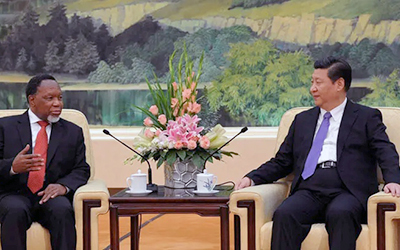Xi Jinping’s Counter-Reformation and China’s New World Order

Theatre A, Old Arts (Building 149)
MapXi Jinping is the most powerful Chinese leader since Mao. We hear about his 'mass line campaign', the anti-corruption campaign, his much-touted China Dream and China’s assertive actions in the region, as well as conflicting news about his Belt and Road policy across Asia and into Africa. How can we make sense of what Xi Jinping and the Chinese Communist Party are doing?
This talk offers perspectives from the history of the party and its notable style of rule: rectification. The traditions of party 'state-craft' dating back to the Yan’an in the 1940s and across the Mao period help us see how the Party leadership today interprets the middle income trap for a developing nation: only the party can save China, and only rectification under one supreme leader can save the party. This is a reaction to the reformation in Chinese society over the past two decades. It is Xi Jinping’s counter-reformation.
Presenter
Professor Timothy Cheek, University of British Columbia
Professor Timothy Cheek is Director of the Institute of Asian Research (IAR) at the School of Public Policy and Global Affairs at the University of British Columbia. He is Professor and Louis Cha Chair in Chinese Research at the IAR and Department of History. His research, teaching and translating focus on the recent history of China, especially the role of Chinese intellectuals in the twentieth century and the history of the Chinese Communist Party. His books include The Intellectual in Modern Chinese History (2015), Living with Reform: China Since 1989 (2006), Mao Zedong and China’s Revolutions (2002) and Propaganda and Culture in Mao’s China (1997), as well as edited volumes, Voices from the Chinese Century: Intellectual Debates on China’s Dream (2019) with David Ownby and Joshua Fogel, Mao’s Road to Power: Revolutionary Writings, 19121949, Vol. VIII (2015) with Stuart R. Schram, The Cambridge Critical Introduction to Mao (2010), New Perspectives on State Socialism in China (1997), with Tony Saich, amongst others. In recent years Cheek has been working with some Chinese intellectuals to explore avenues of collaborative research and translation.